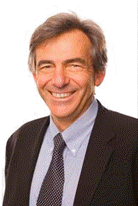|
|
|
|
|
|
|
News & Views item - March 2011 |
![]() Martin Pera Repatriates to Lead Stem Cells Australia.
(March 22, 2011)
Martin Pera Repatriates to Lead Stem Cells Australia.
(March 22, 2011)
 On
March 7 Martin Pera announced that he will be returning this June to lead
Stem Cells Australia (SCA) the successor to the Australian
Stem Cell Centre (ASCC) from which Professor Pera resigned in frustration in
2006 to take over the inaugural directorship of the University of Southern
California's Eli and Edythe Broad Center of Regenerative Medicine and Stem
Cell Research.
On
March 7 Martin Pera announced that he will be returning this June to lead
Stem Cells Australia (SCA) the successor to the Australian
Stem Cell Centre (ASCC) from which Professor Pera resigned in frustration in
2006 to take over the inaugural directorship of the University of Southern
California's Eli and Edythe Broad Center of Regenerative Medicine and Stem
Cell Research.
Stem Cells Australia is to receive $20.7 million over 7 years from the Australian Research Council and $42.3 million from partner organizations. Consortium members are to be made up of Monash University, the University of Queensland, the University of New South Wales, the Victor Chang Cardiac Research Institute, the Walter and Eliza Hall Institute of Medical Research, the Florey Neuroscience Institutes, and CSIRO.
Just how feasible this "confederation" will show itself to be remains to be seen.
ScienceInsider's Elizabeth Finkel interviewed Professor Pera. Below some of the Q&As:
Q: Why did you leave ASCC in 2006?
M.P.: I was frustrated, as were many of the scientists, at what we saw as an inadequate focus on the science. We weren't achieving the synergies that a national center should. The inherent problem was that the ASCC was a hybrid of a biotech and an academic organization and it proved difficult to get the balance right. In the last few years this was corrected.
Q: Why did you decide to move back to Australia?
M.P.: When an opportunity arose to help lead a new consortium in Australian stem cell research, it was a very attractive offer. On the other hand, we'd reached a milestone at USC. We'd built a stem cell program from scratch starting with the basic research and building up the translational side. At our Doheny Eye Institute in a CIRM-supported program, Professor Mark Humayun and David Hinton are planning to trial stem therapies for macular degeneration, and my colleague Michael Kahn has just initiated a phase I clinical trial of a drug for colorectal carcinoma that was developed using a stem cell-based screen.
Q: When ASCC was founded in 2002, Australia had a lead in stem
cell research. Not now. How will the country compete?
M.P.: Australia still has great strengths, many of them a legacy of the ASCC. I don't know too many other consortia which can integrate expertise in embryonic and tissue stem cell biology, tissue regeneration and repair, bioengineering and nanotechnology, materials science, genomics and bio-informatics. The purpose of this grant is to bring these groups together and set up a powerful framework for interdisciplinary research.